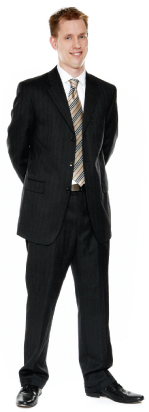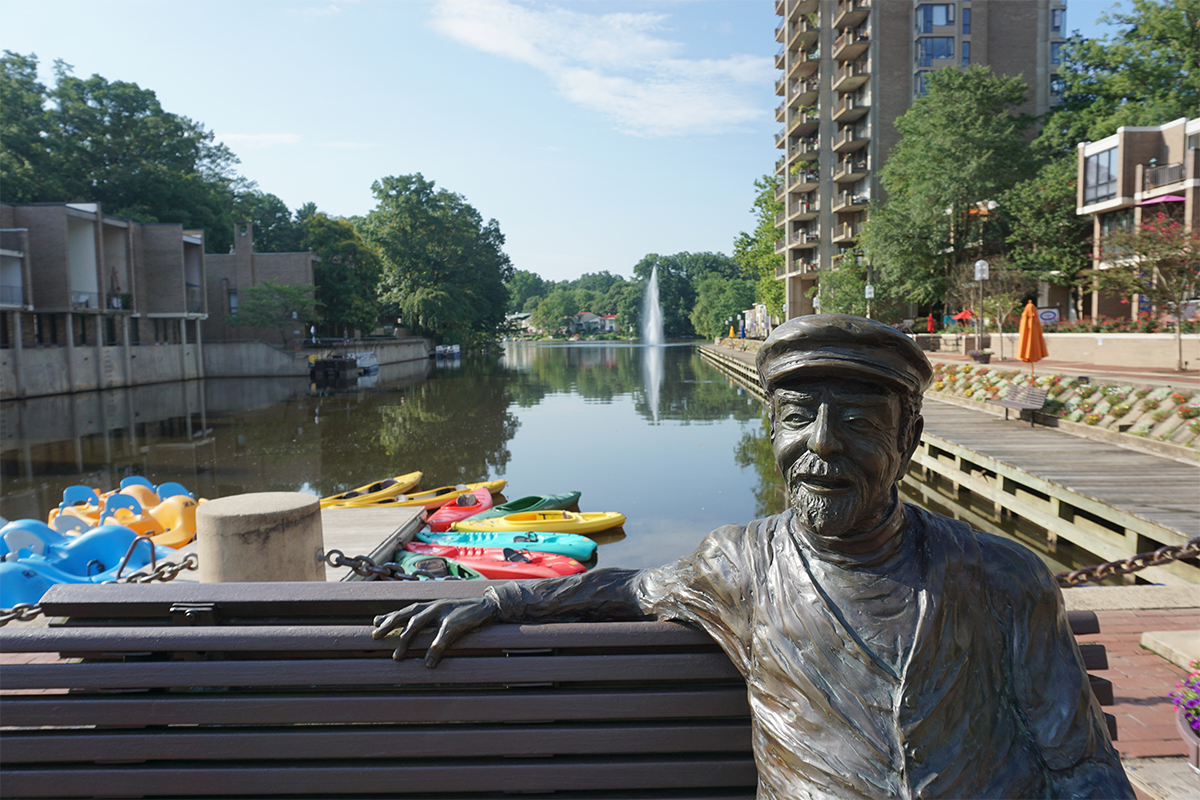Not satisfied with a 9-to-5 job, these under-30 entrepreneurs have set out to make a splash in Northern Virginia
Article by Katie Wilmeth / Photographs by Jonathan Timmes
When Jim Wolfe, entrepreneur in residence at George Mason University’s School of Management, asks his students why they want to start their own businesses at such young ages, “The single answer is, ‘I don’t want to work for the man.’”
“It means they don’t want to punch the time clock. They don’t want to be making money for someone else, and they don’t want to run the risk of being laid off two or three times. They can control their own destiny,” he adds.
Destiny, indeed. The list we’ve compiled features 10 companies founded or run by smart and savvy 20-somethings. From a CEO who launched a technology company in middle school to a Georgetown graduate who worked her way up from intern to part-owner, our list showcases the ones to watch.

THE COMPETITORS
Brandon Labman (26, co-CEO and co-founder)
Tom Moore (26, co-CEO and co-founder)
Company: ROCS Staffing
Headquartered: Fairfax
Founded: 2007
When Brandon Labman and Tom Moore were kids, they played little league basketball together. When they were in high school, they had competing lawn-mowing businesses. As students at George Mason University, they launched a business together.
ROCS Staffing (that’s Responsible Outgoing College Students) works with college students and recent grads to place them in internships, temporary work and other job opportunities that match their skill sets.
Since launching in 2003, ROCS has worked with 150 companies and placed more than 600 students from the D.C. area. “We’ve both always … been entrepreneurial,” says Labman. “It’s somewhat in our blood.”
A staffing company wasn’t something they’d always dreamed about. But when the pair was interning at a lobbying firm for senior citizens, an assignment they received led to the launch of their company. Their boss asked them to recruit more students to help out with a project, and “we literally just ran around the campus and went up to students and asked,” says Moore. “We got 30 or 40 students over a two-week period.”
After the success, they decided to launch ROCS while still in school. “When everybody’s out partying and drinking, we’d be in the office working on a new marketing campaign,” Labman says. “But it was fun, growing the company. That’s what kept us going.”
Moore graduated in 2006, and Labman is set to graduate this year. For now, they plan to continue building up the business locally before thinking about taking it nationally. Says Moore, “We have a giant notebook of ideas that we’ll open up when the time is right.”

THE EARLY BLOOMERS
Wes Cruver (27, CEO and co-founder)
Jodi Wilkinson (26, co-founder and developer)
Jeff Fissel (25, co-founder and business developer)
Company: KZO Innovations
Headquartered: Reston
Founded: 2007
Wes Cruver has been in business since he was 11 years old. And “business” doesn’t mean a cutesy lemonade stand or a stereotypical lawn-mowing service. The McLean native launched Kidz Online—a nonprofit organization that trained inner-city youth how to use technology—while most middle schoolers were still trying to find their locker.
“I don’t think any 11-year-old sets out to dominate the world and sets out to start a profitable company,” says Cruver. “I was really into technology, and my mom wanted me to do something good with technology.”
The nonprofit started out training D.C. students face to face, and grew with technology that allowed Kidz Online to train disadvantaged youth all over the country.
That foray into entrepreneurship led to KZO Innovations.
“The technology we were using [for Kidz Online] … we all hated it,” says Cruver.
Like any good entrepreneur, he decided to find a solution to the problem. Jumping from the nonprofit to the very much for-profit space, Cruver and his business partners developed technology to allow their clients to virtually create, manage and collaborate around video content without regard to time differences or geographical locations.
KZO raised millions in venture capital and has scored some impressive clients, such as Cisco, since its launch.
The company now has 12 full-time employees, including some over 30 to “round out our youthful appearance,” says Cruver.
Still a few years shy of 30 himself, Cruver thinks his youth has had its pros and cons in the business world.
“It hurts and it helps at the same time,” he says. “It hurts mostly on the credibility side. It’s tough to take someone seriously when they’re young, especially when you’re really young. But at the same time it helps to attract a lot of attention.”

THE FAMILIAL FOUNDERS
Jennifer Hsu (26, president and co-founder)
Company: Clairvoyant Technologies
Headquartered: Alexandria
Founded: 2007
In the fifth grade, Jennifer Hsu made a video documentary called “Land of Opportunity” that featured her father, an immigrant from Taiwan and a successful entrepreneur.
“We were greatly influenced by our father,” says Hsu, who launched her business with her sister, Jessica Hsu (who just turned 30 in February). “It would be hard to not give him some credit.”
Today, Jennifer keeps that entrepreneurial spirit with her in Clairvoyant Technologies. The firm designs educational video games that the sisters hope to roll out in schools in the coming years.
The goal of the company is to combine a for-profit business model with a business that can bring about social change—something Hsu has always focused on in all of her endeavors. For instance, while at Emory University, she started a non-profit that matched non-profits, NGOs and businesses focused on global development with volunteer students.
Clairvoyant started as a basic IT consulting firm, but when the sisters won second place in a local business competition for their video game prototype they decided to expand the company. Both sisters have a strong technology background and combined it with their non-profit experience to “leverage that in a field that desperately needs it.”
Their age—and their sex in the male-dominated world of technology—hasn’t been a problem, says Hsu. Except at networking events—where they have to convince people they’re not teenagers.
“Pretty much at events people ask if we’re just graduating from high school,” she says. “People are very dubious of us because we do look so young and inexperienced.”
Their youthful appearance isn’t stopping them, though.
“Between my sister and me … we want to utilize this great machine of entrepreneurship in the United States.”

THE SERIAL ENTREPRENEUR
Harold (Trace) Woodbury III (29, COO)
Company: C3NS and C3RS, among others
Headquartered: Chantilly
Founded: 2004
Trace Woodbury did have a desk job right out of college. What inspired him to leave it and start not one, but five companies and counting?
The word “no.”
“One of the big things I didn’t like about my 40-hour workweek was there was a lack of control,” says Woodbury. “I’d say, ‘Hey what about this? What about that?’ and you get the answer your parents would give you. ‘No, because…’”
So Woodbury and his business partner Chad Koslow (who recently turned 30), launched C3NS. The NS stands for Networking Solutions, and the company is an IT contracting firm that works with clients primarily in the federal space. For example, C3NS worked with the Defense Intelligence Agency to integrate Arabic-translation software.
Woodbury graduated from George Mason University in 2003 with a degree in decision sciences management information systems and worked in IT for the school throughout his college career.
C3NS was only the beginning. Woodbury—who last year was awarded the School of Management’s Young Alumnus Award—is a true serial entrepreneur.
Woodbury and his business partner also launched C3RS (for Recycling Solutions) —a $7 million project that recycles tires. The green company has so far saved enough electricity through its program to power 50,000 homes.
Another of his companies, Avant Motor Company, builds replicas of high-end cars. Woodbury also has two companies dealing with fire safety and inspection. And more are likely not far behind.
“[Entrepreneurship] is the job that you would do 1,000 hours a week if they existed,” says Woodbury.

THE BORN BUSINESSMAN
Joel Holland (25, CEO)
Company: Footage Firm
Headquartered: Reston
Founded: 2001
Joel Holland has always been goal- and profit-oriented. As a preschooler, he would collect rocks and sell them to his neighbors. When he got a bit older, he switched to golf balls he collected on a nearby green. In middle school, he started selling software to help people organize their collections (such as rocks and golf balls).
But it was his work with Kidz Online (whose founder also made this list) that led him to launch his company, Footage Firm.
To fulfill a school service requirement, Holland worked with Kidz Online, a nonprofit that taught inner-city kids how to use technology. When Rep. Tom Davis came to the offices for an on-camera interview, Holland was tapped to interview him. Holland loved it some much he launched his own show, “Streaming Futures.”
“I’ve always been blindly ambitious,” says Holland, who went on to interview Arnold Schwarzenegger, Steve Forbes and other celebrities and business titans.
When Holland was editing his Schwarzenegger interview, he realized he didn’t have any footage of Hollywood to mix into the piece. That led to the launch of his own company.
Holland started Footage Firm by shooting footage of D.C. landmarks and selling the tapes on eBay. But “I didn’t want to be a small business owner. I didn’t want to be selling it on eBay,” he says. “I wanted to be the next eBay.”
Today, Footage Firm has more than 30,000 clients, including all the major networks (NBC’s “30 Rock,” for example, uses his New York scenes), as well as production companies, schools, churches and other groups who need royalty-free footage of major cities.
His ambition earned him a spot in Business Week Magazine’s “Top 25 Entrepreneurs Under 25.”
He says he plans to grow the business, but that eventually “it will be on to the next thing.”

THE MILITARY MOGUL
Joe Ordia (29, CEO & President)
Company: Ordia Solutions
Headquartered: Vienna
Founded: 2006
One of Joe Ordia’s first jobs was quite the intimidating assignment. With Defense Advanced Research Projects Agency (DARPA) as a client, he was tasked with building a “command post of the future” for the Army.
“The military used to manage warfare … with a big map in a tent in the middle of nowhere with a bunch of generals standing around it,” explains Ordia.
But using some high-level technology, Ordia designed a product that didn’t require everyone to be in the same room, or even the same country, to strategize. His company delivered the project in 2004 to DARPA.
Then the tsunami in Bali happened, and Hurricane Katrina—and Ordia realized what he had designed could have wider implications.
“That was really the straw [that] broke the camel’s back,” Ordia says of seeing the destruction and poor emergency response after Katrina. “After my second trip to Iraq I got to thinking, if this has been so valuable to the Army, then I thought cops and firefighters and other rescue workers ought to have the same thing.”
Ordia recreated what he’d done for the Army using commercial technology (such as GPS and Google maps vs. the Army’s top-secret technology) and launched his own company in 2006 with the help of angel investors.
Ordia Solutions clients now include city police departments and federal clients.
In a volatile market, Ordia says his age has helped. “I’m young enough because I never got too set in my ways,” he says. “I can roll with the punches.”
But he filled the seats of his board of advisors with people born when generals were still strategizing with big maps in a tent.
“When you are young, you absolutely have to realize that you don’t know everything.”

THE ‘REAL’-IST
Rajiv Shenoy (23, CEO)
Company: Orca TV
Headquartered: Fairfax
Founded: 2009
After graduating from John Hopkins University in 2008, Rajiv Shenoy worked at Citigroup in New York City for one year.
Exactly one year.
“As soon as my one-year anniversary was up, I quit and moved back home,” says Shenoy, who knew he wanted to be an entrepreneur.
Shenoy comes from an entrepreneurial family, but they wanted him to get a year of real-world experience before striking out on his own.
Orca TV wasn’t an entirely new concept. Shenoy came up with the idea for Orca TV—which provides large-screen, interactive advertising opportunities to students, faculty and outside companies on college campuses—when he was still a student.
As a sophomore, he approached the Dean of Student Life with his idea for getting the student population more involved. With multiple television screens in high-traffic areas like the student center, students would have an opportunity to spread the word about upcoming activities (such as club meetings, fraternity functions, etc.).
The project was a success, and Shenoy kept it running even after he graduated. Now fully focused on the company, he’s also added an advertising component for non-students and faculty, as well as use of the screens for emergency response. The entire system is web-based, allowing students and advertisers to upload their content from anywhere.
George Mason University is an Orca TV client, and Shenoy—who is co-running the company with his mother—says he has plans to expand throughout the Northeast.
He says his age has mostly been a plus and that the business experience of his mother, a long-time GE employee, rounds out his credibility.
“Since I’m 23, I’m full of energy and enthusiasm,” he says. “There’s no risk.”

THE MONEY MEN
David Andrukonis (27, CEO and Co-founder)
Will Marlow (27, COO and Co-founder)
Company: Alumni Fidelity
Headquartered: Arlington
Founded: 2007
Like many 20-somethings, David Andrukonis and Will Marlow were inspired by President Obama’s campaign. But it wasn’t because of his message. It was because of his money.
As the pair watched Obama raise millions through grassroots online donations, a light bulb went off—and a business was born. “[Will said,] ‘There’s something really pioneering going on here,’” recalls Andrukonis.
The duo, both 27 and graduates of Yorktown High School in Arlington, turned to the university space. “We both knew that universities had a hell of a time trying to get young alumni to donate, or anyone for that matter,” says Andrukonis.
Alumni Fidelity helps schools and other organizations raise money through social networking. Rather than the president of your alma mater sending a letter asking for funds, your ex-roommate (or sorority sister, or friend from English class) sends the request via a web page with the idea that you’re more likely to donate when the request comes from someone you know.
Alumni Fidelity’s 30 clients include Yorktown, Marlow’s alma mater, William & Mary, and the Arlington Soccer Association.
The company lined up angel investors last year and is focused on growing its client base. Andrukonis says their youthful excitement has helped them—especially when it comes to their “gray-haired” group of advisors. “Anybody can feel good about helping young people do something awesome.”

THE METER MAIDS
Cesar Devers (20, CEO)
William Kelly (21, CFO)
Ashley Eidson (20, CIO)
Company: Cspot
Headquartered: Virtual office
Founded: 2009
Most college students home for the holidays use the break to catch up with family and maybe hit up some bars. But last Thanksgiving NoVA natives William Kelly, Ashley Eidson and Cesar Devers used the time to come up with ideas for a company.
Devers, a student at Princeton, wanted to enter a business competition at his university and enlisted his friends to help him brainstorm ideas.
The trio came up with Cspot (that stands for college, commuter or city), a business based on the idea that people will pay to reserve parking in high-traffic areas. “We were going through ideas. What do people do need? What in our own lives do we need?” says Kelly, a Virginia Tech senior.
Parking on college campuses was a headache—and from that observation Cspot was hatched.
Devers entered the Princeton competition and made finals.
The company works like this: Those in search of parking can sign up for a Cspot membership that allows them to search and reserve parking spots from an online database. A bidding system gives the spot to the highest bidder (a cap is put on prices). Using the same technology as E-ZPass, the company allows the highest bidder to park in that space for the allotted amount of time. Similar to Zipcars, the reserved spots are painted an identifying color and mixed in with the regular, non-Cspot spaces.
The fledgling company is now in search of financing and getting ready to launch a beta test on Virginia Tech’s campus.
Still in school, the three business partners—along with several developers—work virtually. Kelly says he would love to run the company full-time upon graduation, but the just-old-enough-to-drink college senior says he’s keeping his options open. He’s pursuing a degree in finance and is also an accomplished violinist.
Sounding exactly like a 20-something with the world at his feet should, Kelly says, “When I come across something that I really enjoy and have a passion for I have to pursue it.”

THE MIGHTY DO-GOODER
Colleen Jolly (28, Principal)
Company: 24 Hour Company
Headquartered: Falls Church
Founded: 1992
Call her Mighty Mouse.
Because as an intern at the company where Colleen Jolly is now part owner, it’s that image that got her through the long nights of hard work.
“I really fell in love with the ‘Mighty Mouse syndrome,’” says Jolly. “We help companies prepare their presentations and proposals. Often it’s one little intern at 2 in the morning making sure the fonts are correct, and it could affect a billion-dollar contract. Being that little Mighty Mouse really appealed to me.”
So much so that Jolly, who moved from Florida to go to school at Georgetown University when a distant cousin offered her a paid internship at 24 Hour Company, worked her way up through the ranks to become a part-owner in 2004.
The multimillion-dollar company primarily works with government contracting clients to “take their 10 pages of dense text and turn it into one slide that the layman who is ultimately going to buy their product is going to understand,” explains Jolly.
Today, Jolly handles all of the company’s billable projects and 50 percent of sales—in addition to flying back and forth between Falls Church and London, where she recently launched a U.K. branch for the company.
As a 20-something heading up an international business, Jolly could easily take her experience and head to a much larger corporation—or start her own company. But for now, she says bigger isn’t better.
“For me it’s really the sense of tribe. I have throughout my life felt like I could lead people to better things for themselves and their families,” Jolly says. “Being in a small company and seeing that is really inspiring. Twenty families relying on me; that’s powerfully scary and empowering at the same time.”
(May 2010)




